Some buyers shy away from high-mileage cars. Others see it as a badge of honor, and an indication that a car has been maintained properly; if it hadn’t, it wouldn’t have attained such lofty numbers on the odometer. Opinions differ on what constitutes “high mileage,” but most people can agree that when the first digit flips to 3, you’re getting up there. Today, we’re going to look at two such long-haulers, both for the same price of $3,500.
Yesterday, we looked at a fancy Jaguar and a plain-jane Ford Escort, both for the same price. I had no idea how this one was going to go, and the vote was pretty close, but in the end, the twelve-cylinder Jag won. You all are a lot braver than I thought, or you really hate Ford Escorts.
Me, I wouldn’t touch that Jag if you gave it to me. I have had my fill of cantankerous British cars, and all I see there is a future full of cuss words and increasingly expensive online orders to Moss Motors. Soneone else is more than welcome to it. An Escort Pony isn’t exactly a dream car, but it would be fun to mess around with for a while, and is far less likely to make me want to throw a tool.
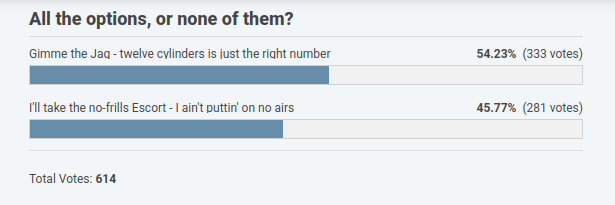
The highest-mileage car I’ve ever had was a 1991 Nissan Pathfinder, which finally succumbed to electrical problems (but still ran and drove) somewhere north of 360,000 miles. By the end, you could feel every one of those miles in the worn-out seat and suspension, and hear them in a mournful groan from the transmission in every gear except 4th. The highest-mileage car I’ve ever driven was a Chevy Astro van owned by a delivery fleet company, back when I was working at a garage. It had 670,000 miles on it, and was on its third engine and transmission, but still chugged along faithfully. They offered to sell it to me for cheap when they finally retired it. I declined, but I often wondered.
Today’s cars have both cleared 300,000 miles, and one of them is on its way to 400,000, and the sellers claim they’ll go much further. Knowing the reputations of both vehicles, I don’t doubt it – but which one would you actually want to keep racking up the miles in? That’s what we’re here to find out.
1996 Volvo 850 Wagon – $3,500

Engine/drivetrain: 2.4-liter DOHC inline 5, five-speed manual, FWD
Location: Austin, TX
Odometer reading: 391,000 miles
Operational status: Runs and drives “like it has 91k miles”
Volvo has a longstanding reputation for making cars that last, and for instilling the kind of brand loyalty that marketing execs can only dream about because of it. But in the mid-1990s, Volvo put its long-running line of rear-wheel-drive cars out to pasture and replaced them with an all-new front-wheel-drive platform. Would the new design be as durable as the old? Well, it has taken thirty years, but I think we can definitely answer that question “yes.”
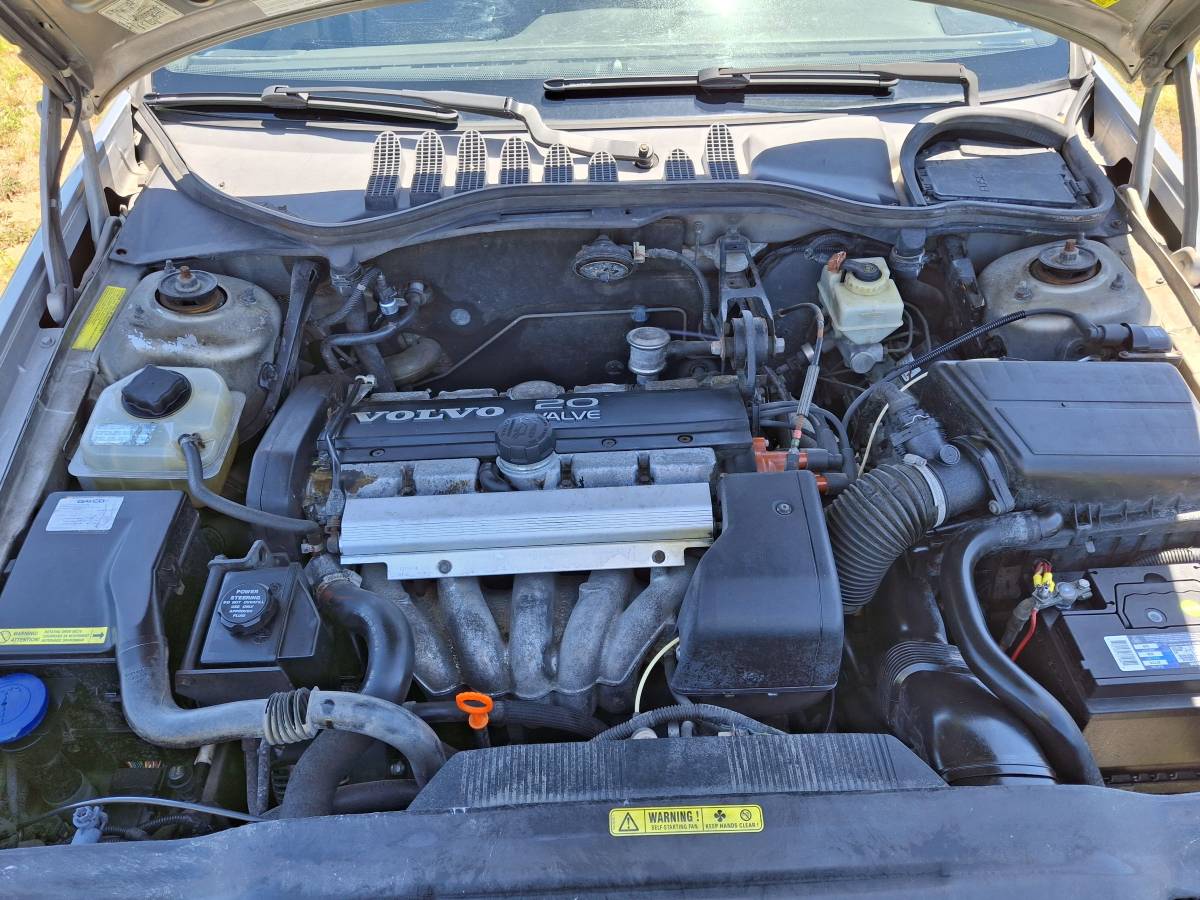
Out went the old “red block” four-cylinder, and in came an inline five, mounted transversely. This one is a 2.4-liter, with four valves per cylinder, driving the front wheels through a five-speed stick. The seller says it runs great, and it just received a new battery, fuel pump, and fuel filter.

This car is rapidly closing in on four hundred thousand miles, but I’ll be damned if it shows in the interior. There’s a cover on the driver’s seat, which I assume is hiding some wear, but the rest of it looks just fine. Oh, and the seller says the air conditioning is nice and cold.
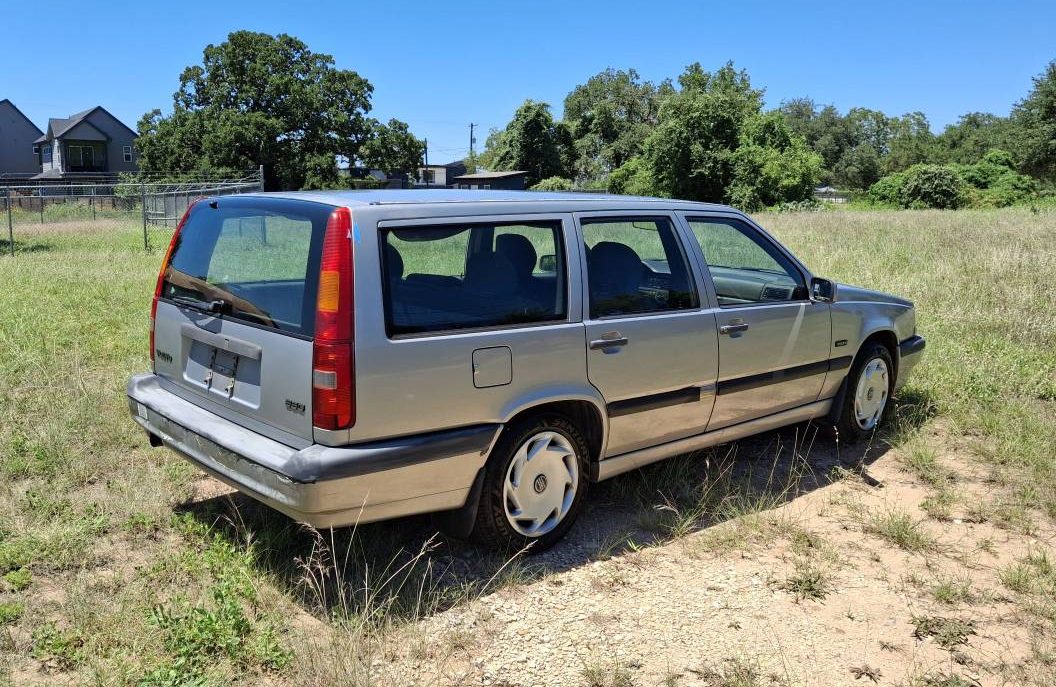
It’s a little faded here and there, and the trim is damaged in a couple spots, but it sure looks good for the mileage. I always preferred the sedan version of the old 240 to the wagon, but the 850 wagon is a really handsome machine. And this looks like a really good example.
2001 Toyota Sequoia SR5 – $3,500

Engine/drivetrain: 4.7-liter DOHC V8, four-speed automatic, RWD
Location: Curtice, OH
Odometer reading: 306,000 miles
Operational status: “You can hop right in and daily drive it”
Toyota trucks have been piling on the miles for decades as well, and not just the little ones. The T100 and Tundra full-size trucks have proven themselves just as durable as the little 20R/22R-powered ones. The Sequoia SUV uses the same platform as the Tundra, so at a little over 300,000 miles, this one should be just getting started.
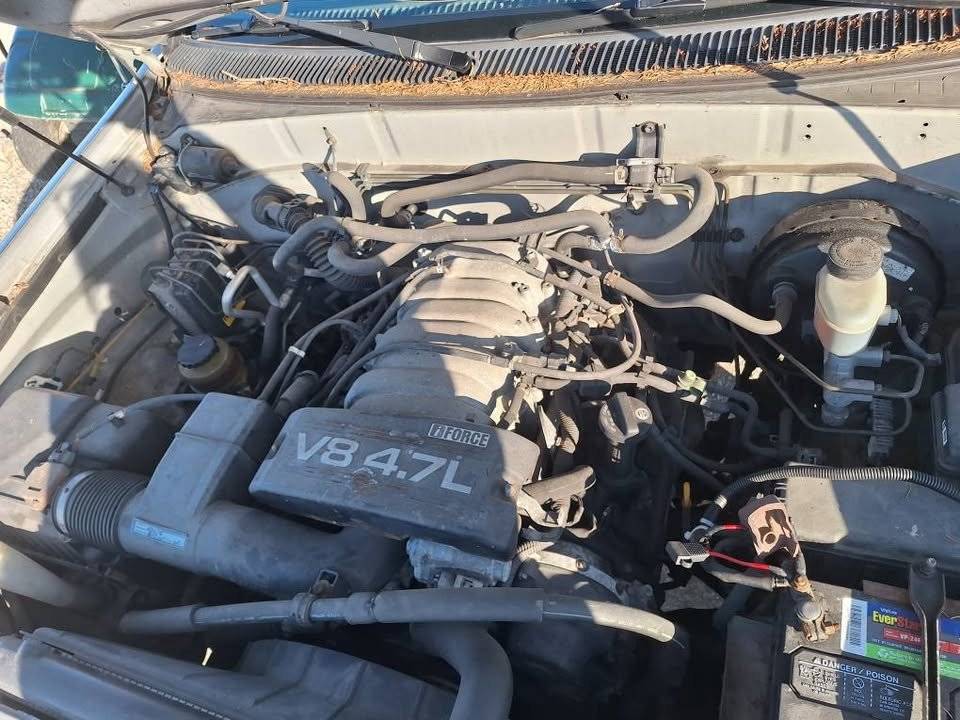
A big truck needs a big engine, and in the case of the Sequoia, that means a 4.7-liter V8, backed by a four-speed automatic. Most Sequoias you see are four-wheel-drive, especially in snowy places, but this truck originally came from Florida, where the extra foul-weather traction isn’t required. If you don’t need 4WD, why pay for it, or deal with the extra weight and maintenance? This truck runs and drives great, according to the seller, and needs nothing to be put into regular service by a new owner.
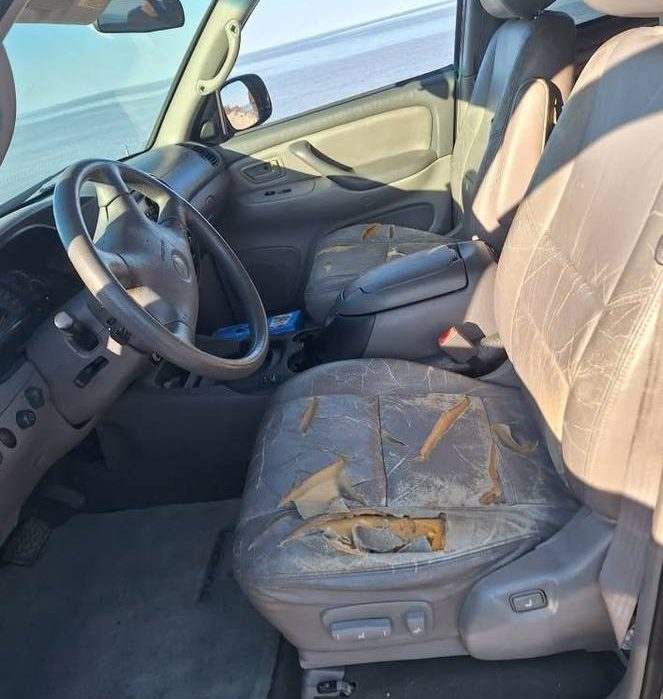
Well, almost nothing. The front seats are pretty much trashed; you’d probably want to put some covers on them. Replacing or reupholstering them probably isn’t worth it. The rest of the interior looks all right. The seller says they replaced the latch on the tailgate, but doesn’t mention the condition of anything else. My hope would be that that means everything else works.

Since it was a Florida car, it’s nicely rust-free. The trim strip under the grille has a little surface rust, but that’s about it. There are some paint blemishes here and there, but nothing worth worrying about. It got new tires three years ago, and the windshield was recently replaced. The seller also equipped it with a trailer hitch, brake controller, and helper springs in the rear, so it’s ready to tow if you want it to.
These both probably have quite a lot of life left in them, but I bet they both feel tired. That Pathfinder we had still drove just fine, but it felt hollowed-out, threadbare, like all the niceness it might have once had was worn away, leaving nothing but brute function. I imagine these are similar. But at this price, proven durability and reliability mean a lot. So which one are you willing to take a gamble on: the Swedish brick, or the extra-value-size 4Runner?

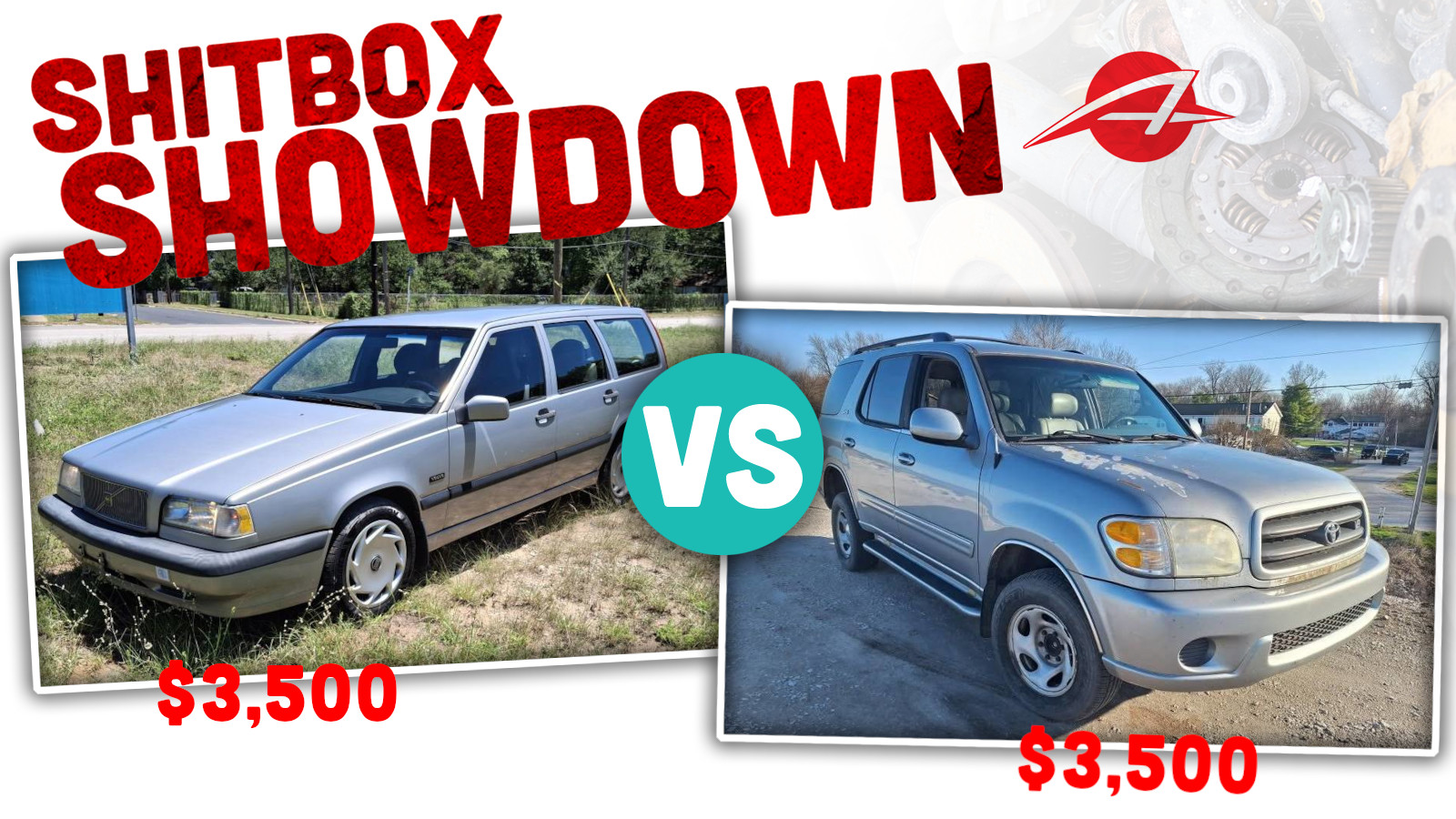




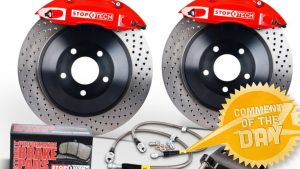


That’s an old George Bush joke, “Mr. President, last night, 68 Brazilians lost their lives in terrible flooding”. George pauses for a moment. “Is that a lot?”
I’m a huge toyota fan but I’d still take the volvo in this case. They are both high mileage but you can tell just from the limited pictures that the volvo has been taken care of. The toyota has not been unfortunately. I mean, they can’t even find the right size tires to put on the rear of the car. No telling what else has been neglected on it.
I like those first-gen Sequoias but the Volvo presents so much better, also manual wagons are still peak daily imo.
I’m only replying because of your name. I bought a 944 Turbo to play with and tried calling my local dealer to see about a dupe key. The lady on the phone, in her most snootiest voice possible, corrected my “Poorsh” with “Poor-SHAH”.
Seems like a strange thing to do when a person is trying to give you money, but whatever.
You can go get a key cut at the hardware store. It’s probably a VW blank.
When I bought my Boxster I was corrected by a couple people selling on Craigslist. I picked the name because I found it obnoxious, and some people really exaggerated the pronunciation (imo). I switch between the correct and incorrect pronunciation, but there was some real pearl clutching going on over $7k roadsters. Heaven forbid they found out I wasn’t planning to use Porsche branded coolant.
Can’t really go wrong with the UZ V8 *OR* the B5244.
The Volvo looks cleaner, and while cheap 850s can be expensive, that one looks to be in less ratty shape than the Toyota, doesn’t have the future even RWD two-wheel drive hardware maintenance. And it has a manual.
And I love them.
So Volvo.
The Sequoia has a few things that wont help it. Belt Drive on that 4.7 V-8. So every 125K miles means replacement. The original Self-leveling suspension has been replaced with something awful and it shows in the stance and wheel wells. Lastly, that interior is trash and I’d bet large $ that the lumbar support has been stuck at full forward making the drive that much more unpleasant.
With nothing more than seeing that, the Volvo is by far a better choice.
Air leveling suspension was not available on 2001 Sequoias. This one appears to be wearing tires smaller than the factory diameter.
Pretty much all Sequoias with this kind of mileage have thrashed leather seats. Mine did. I put covers over them.
I find the Toyota interesting. I never knew that Marvel had filmed a fight scene between Wolverine, Sabertooth and Lady Deathstrike inside of an SUV.
5-cyl + 5-speed wins every time.
Plus, if I was gonna buy a Sequoia, it would definitely be 4WD.
I’m not sure it’s worth $3500, but at least the wagon should get much better gas mileage than the Sequoia. Its better overall condition doesn’t hurt either.
A Volvo with almost 400k and a Toyota with over 300k, and they both have TIMING BELTS on interference engines???!!
How could that ever be possible?
I was told by someone that timing belts = unreliable hahaha
I voted Volvo due to condition. It’s been better maintained through its life. At some point that Sequoia was bought be someone who’s logic was it’s a Toyota so it’ll run forever with no maintenance.
In reality, both of these are nearing the end of their life and I wouldn’t spend real dollars for either.
I’m on volvo number five. They’re pretty solid, but they absolutely need a good bit of love to keep on like this one did.
Someone had to know well enough to change the timing belt, deal with the PCV system, at bare minimum. The fact that this one doesn’t have a turbo is certainly part of why it’s got so many miles. Yes, the turbo is certainly welcome, but the NA 5 cyl is living the easy life. You won’t get there fast, but you’ll certainly get there.
Not only do Volvos need a bit of wrenching, in the hands of a ham-fisted clot, they’re easy to break (ask me how I know). Someone not only had to spend the time and money to care for this, but they actually had to know what the hell they’re doing.
I guess that’s my point. It was clearly better taken care of over that rats nest of a Sequoia which is why I voted for it. However, at nearly 400k miles the $3,500 asking price feels like a down payment on a lot of mechanic fees/repair bills to keep it going.
That was what I was thinking when I gave the nod to the Toyota. Yeah it’s a mess, but I was thinking it would likely be a lot cheaper to keep running where the Volvo has potential to get a lot more expensive quickly. The Toyota will have plenty of cheap parts or even junkyard find options that the Volvo likely won’t.
None of those are knocks against the Volvo, just thinking a bit further down the road for a likely buyer.
no such thing as a rust free florida car!!!
Morty Seinfeld agrees with that take.
Yesterday, I saw a post where someone had refreshed a Sequoia with high miles and they’re still driving it today.
Given what a replacement would cost with even half the miles, $3,500 plus some new seat covers, new (unreliable) timing belt, and suspension bits would probably pencil out better for the occasional heavier-duty jobs I would use it for.
The Volvo would end up as another daily driver, but one I’d be worried about the clutch on. Or whatever else was at the end of its life. Miles aren’t the only wear indicator, no, but they’re not irrelevant either.
I’m at the point where I want a newer, lower mile, reliable daily driver, not some car I’m going to have to muck about with on a cold day when it fails.
I expected to vote for the Toyota, but that thing is ragged out. It may well keep going, but I don’t want to be in it. The Volvo on the other hand is in excellent condition. I’ll take my chances there.
Ick, no thanks on that Sequoia. What a nasty interior. At least the Volvo is clean.
I need a tow rig more than I need a wrong-wheel drive Volvo wagon.
I could go either way, but I voted Sequoia. I ride most days, so the low mpg isn’t that big a deal to me.
Both.
Where’s the option for both?
I’ll make the case for a 2UZ family hauler every single day of the week. Sure the Volvo is sweet, but that Sequoia will run until the heat death of the universe with nothing but basic maintenance and a TB/WP change once a decade. Parts like seats are readily available used in better shape, and they’re dead simple to work on. You’ll pay out the rear for fuel, but you’ll be certain to get where you want to go every single time, and I can’t say I’d have a quarter of that confidence on a nearly 400k mile Volvo.
Volvo for me. Nice price if an 850 wagon is your (Gus) Fring.
Thought I’d seen it before – price reduction from $4,500
https://www.jalopnik.com/1928486/1996-volvo-850-estate-for-sale-4500/
I usually love Toyotas but that Sequoia is a bio hazard.
So for the Sequoia:
About 500 000 km at around 16 l/100km gives about 80 000 liter of E95 or € 120 000 to do this in Belgium.
I know fuel is cheaper where you live, but this guy must really love the smell of a V8.
I own one of these and only drive it when I really need it.
I’m a Toyota fan, but no contest.
Manual wagon with cold AC and looks like someone took care of it. Gimme the brick.
My thoughts exactly!
That Volvo would have sold already if it were brown
A manual wagon over a 2wd suv. No contest.
I never understood the Toyota cultists. Surely my own predilections are just as inscrutable to them. We can both wonder about the other as we each pass by; me in my 400,000 mile boring brick, them in their 300,000 mile somber slab.
Volvo for me, thanks.
The remarkable thing about that Volvo isn’t so much the miles, as the fact that the odometer caught them all. 850s are notorious for odometer gear failures. There’s a not-insignificant chance that this car has had a replacement, and its actual mileage is higher. The slight warping of the dash cap above the center A/C vents is sometimes a sign of a dash cap that’s been lifted to extract the instrument cluster to do the odo fix, but they also sometimes just warp like that. Only an OBD scanner could say for sure if the miles are accurate.
The cold A/C is also remarkable. My 850 wagon didn’t have that, and that was 20 years ago. I still miss it anyway.
Station wagon with a stick, and it’s a Volvo? “They’re boxy, but they’re good”. Volvo for me today!
Boxy & Volvo is a strong positive feature imho.